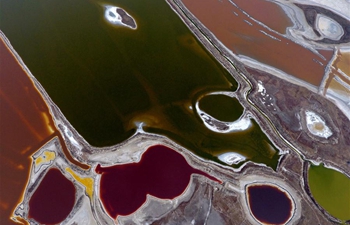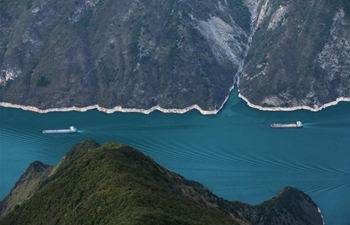CHICAGO, March 27 (Xinhua) -- Shoreline erosion can transform freshwater wetlands from carbon-storage pools to carbon sources, according to a study led by researchers at Illinois State Geological Survey (ISGS), part of the Prairie Research Institute at the University of Illinois (UI).
A news release posted on UI's website on Wednesday said the researchers developed a new model that works like those that assess the carbon budgets of coastal saltwater environments, but with modifications to account for the unique characteristics of freshwater ecosystems. A carbon budget refers to a tolerable quantity of carbon dioxide that can be emitted in total over a specified time.
Illinois Beach State Park, located along the shore of Lake Michigan just north of the Chicago area, is a coastal environment that has remained mostly undisturbed by human encroachment. This makes it an ideal location for a study that focuses on landscape change over time.
Collecting a series of vertical soil cores, the researchers have determined the age and amount of carbon present within intact layers of soil, sand and vegetation.
"We start by sampling near the shore and move inland, collecting from the different environments like beaches, dunes, wetlands and so on," said Katherine Braun, an ISGS researcher and lead author of the study. "It is like going back in time vertically and horizontally."
The researchers found a large mismatch between how long it takes the carbon to accumulate versus how long it takes to erode. "Ten percent of what took 500 years to accumulate disappeared in a six-month period. This wetland -- or carbon reservoir, if you are looking at it from a carbon-budget perspective -- took a permanent ding. The rate at which wetlands may rebuild can never catch up to the rate at which they were eroded," Braun said.
The study period coincides with the highest Lake Michigan water levels in approximately 30 years. "Many would think that storm events would be the major source of erosion, but we found that the less violent but chronic wave attack from choppy waters, combined with the higher lake level, appear to be the culprit here," said Ethan Theuerkauf, an ISGS researcher and the study's co-author.
Monitoring the field sites after storms allowed the researchers to conclude that large wave-action storm events buried wetlands under large deposits of sand. "These sand deposits inhibit additional carbon storage, but also play a protective role by slowing down additional erosion and export," Braun said.
The researchers plan to continue this study by tracking the fate of the eroded carbon. "Our continued work will allow us to expand the study across spatial parameters, not just time and not just around the Great Lakes region. The model can be applied to almost any freshwater coastal area," Theuerkauf said.
Freshwater wetlands account for as much as 95 percent of all wetlands, freshwater and marine, and have one of the highest carbon-storage rates of any environment, the researchers said.
The findings have been published in the journal Scientific Reports.













